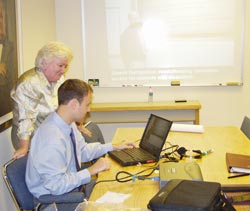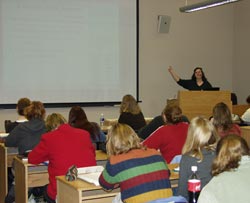

| Daily News | News Releases | Special Bulletins | Daily News Archives |
| The View from Trent | Trent Magazine | Focus Trent | Build 2000 |

Liberated Learning through voice recognition technology
 A
new approach to "liberating" the learning process is being tested
at Trent University.
A
new approach to "liberating" the learning process is being tested
at Trent University.
Based on voice recognition technology, the Liberated Learning concept has been designed for special needs students, although some institutions are also finding it is beneficial for english-as-a-second-language (ESL) students and others.
"This requires a wireless mic, special software, an editor, a powerful computer and a researcher," explains Trent’s Special Needs Co-ordinator Eunice Lund-Lucas.
The computer is set up in a lecture hall or classroom and, as the professor talks, voice recognition software translates the dialogue, in real time, into text that is displayed to the class on a large screen. For this to be successful, the professor first creates a personal voice profile so the computer can understand what they are saying and interpret various inflections of speech.
After class, the text is edited to catch translation errors, and notes can then be made available to students. This allows students to read through lecture content at their own pace.
To bring this technology to Trent, Ms. Lund-Lucas has been working with the Atlantic Centre of Research, Access and Support for Students with Disabilities at Saint Mary’s University in Halifax. Saint Mary’s created the Liberated Learning project and has been pleased with the results. A report states: "The initial testing of this application for speech recognition was enlightening. Our brief exposure to the concept suggested it could indeed provide an alternative to conventional note taking for students with disabilities. Serendipitously, we also noticed that non-disabled students were using the instantaneous display of the lecture as a reference check for their own notes - the concept gave students access to both auditory and visual learning channels, helping them better integrate the lecture content. They could use the software-generated notes to embellish or augment their own notes. Therefore the successful application of speech recognition technology was seen to have valuable implications for every student in the classroom."
 Two
Trent professors, Elaine Scharfe (psychology) and Richard Hurley (computer
studies), are now testing the software in their classes. Professor Scharfe
implemented the new technology on the first day of classes after Christmas,
January 6.
Two
Trent professors, Elaine Scharfe (psychology) and Richard Hurley (computer
studies), are now testing the software in their classes. Professor Scharfe
implemented the new technology on the first day of classes after Christmas,
January 6.
"We will look at the outcomes for students and we are hoping, if our experience is positive, to present the technology at science and humanities research days," says Ms. Lund-Lucas. "My goal is to have someone such as Bonnie (Patterson, president of Trent) trained to use it for the welcome address in the gym by March break, 2004. Now that would be innovation in action."
Until notes are able to be posted online at Trent, CDs will be created containing all digitized lecture materials.
Other colleges and universities involved in the project include Saint Mary’s University, the University of the Sunshine Coast in Australia, University College of Cape Breton, Cambrian College and California State University. Ryerson University and Durham College were involved in phase one of the project.
Photo 1: Trent University's Special Needs Co-ordinator Eunice Lund-Lucas has worked with Keith Bain from Saint Mary's University in Nova Scotia to introduce voice recognition software in Trent classrooms.
Photo 2: Psychology Professor Elaine Scharfe is one of two Trent faculty members to participate in introducing voice recognition technology into the classroom. While she delivers a lecture, corresponding real-time text appears on the large screen behind her.
Back to Trent's Daily News